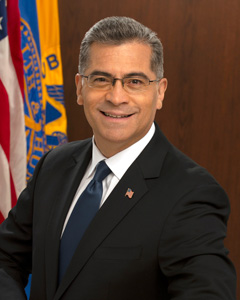Following President Joe Biden’s State of the Union Address on Tuesday, February 2, 2022, Health and Human Services (HHS) Secretary Xavier Becerra kicked off the National Tour to Strengthen Mental Health in an effort to hear directly from Americans across the country about the behavioral health challenges they’re facing and engage with local elected officials and leaders to strengthen the mental health and crisis care system in our communities.

Xavier Becerra
Secretary
U.S. Dept. of Health and Human Services
“The pandemic has not only taken a physical toll on all of us, but also brought on greater behavioral health challenges for everyone,” said Secretary Becerra. “From small towns to big cities, I’ll be traveling nationwide with members of my leadership team to meet with people who have been hit particularly hard, and partnering with local leaders to find ways to save lives in our communities. The Biden-Harris Administration will continue to deliver on our promise to build back better – and healthier.”
As President Biden launches a whole-of-government strategy to transform mental health services for all Americans, Secretary Becerra is leading HHS to address the mental health challenges that have been exacerbated by the COVID-19 pandemic, including substance use, youth mental health, and suicide. Building on work that agencies and offices across the Department have already been doing, Secretary Becerra and HHS leaders will hit the road in a concerted effort to deliver on the Biden-Harris Administration’s priorities to tackle these challenges.
Over the next few months, Secretary Becerra will make announcements on new initiatives and various resources provided by HHS, such as increasing the number of behavioral health professionals and community and behavioral health support workers in underserved and under-resourced communities, expanding pediatric mental health care access through telehealth services, and the transition to 988: America’s Suicide and Crisis Lifeline. Through meetings with partners, local leaders, and elected officials across the country, the Secretary will highlight the work HHS is doing and also take time to listen and gather ideas about ways to partner with states and communities to strengthen mental health services, and what more the Department can do.
The term “behavioral health” refers to the promotion of mental health, resilience and wellbeing; the treatment of mental and substance use disorders; and the support of those who experience and/or are in recovery from these conditions, along with their families and communities.
Provisional data from the Centers for Disease Control and Prevention (CDC)’s National Center for Health Statistics indicate that there were an estimated 100,306 drug overdose deaths in the United States during the 12-month period ending in April 2021, an increase of 28.5 percent from the 78,056 deaths during the same period the year before. To combat this crisis, Secretary Becerra announced the release of the new HHS Overdose Prevention Strategy, designed to increase access to the full range of care and services for individuals who use substances that cause overdose, and their families.
Even before the COVID-19 pandemic, mental health challenges were common, with 1 in 5 adults experiencing a mental illness in any given year. Mental health challenges were the leading cause of disability and poor life outcomes in young people, with up to 1 in 5 children ages 3 to 17 in the United States having a mental, emotional, developmental, or behavioral disorder.
Additionally, from 2009 to 2019, the share of high school students who reported persistent feelings of sadness or hopelessness increased by 40 percent, to more than 1 in 3 students. The share of high school students who seriously considered attempting suicide also increased during this period, by 36 percent. The pandemic only exacerbated youth mental health challenges. In December 2021, the U.S. Surgeon General Dr. Vivek Murthy issued a new Surgeon General’s Advisory to highlight the urgent need to address the nation’s youth mental health crisis.
“Our country faced a mental health pandemic long before the COVID-19 pandemic began, and it was exacerbated by the traumatic effects of the past two years. That’s why, last December, I issued a Surgeon General’s Advisory on protecting youth mental health – because it will take policy, institutional, and individual changes alike to reframe and address this crisis with the urgency it deserves,” said Surgeon General Vivek Murthy. “I am grateful to Secretary Becerra and the Biden-Harris Administration for recognizing this, and for their commitment to work with communities across the country to strengthen and protect mental health.”
According to the CDC, in 2020, suicide was among the top 5 leading causes of death for people ages 10-64. Suicide was the second leading cause of death for people ages 10-14 and 25-34. Some groups have higher suicide rates than others. Among the highest rates are American Indian/Alaska Native and White populations, veterans, people who live in rural areas, and young adults who identify as lesbian, gay, or bisexual.
The National Tour to Strengthen Mental Health will also promote health equity and prioritize hearing from diverse voices. The Secretary will travel to traditionally underserved communities and hold conversations in spaces and places that are under-resourced. As the Secretary leads the Administration’s efforts to ensure equitable access to health care, HHS will continue working across the Department and in partnership with other agencies to close behavioral health disparities and invest in comprehensive treatment, early intervention, prevention, and recovery support services for all Americans.
The Secretary also intends to bring with him a message of hope – because in the face of startling statistics, there are prevention strategies that work and stories of resilience that should be shared. For example, providing 24/7, free and confidential support to people in crisis works – numerous studies have shown that the existing SAMHSA-funded National Suicide Prevention Lifeline helps thousands of people overcome crisis situations every day. The transition to 988 in July will make it more accessible.
Photos and videos of the National Tour to Strengthen Mental Health stops will be available at: HHS.gov/HHSTour.
Tour stop details will be announced in the coming weeks and throughout Spring 2022.




